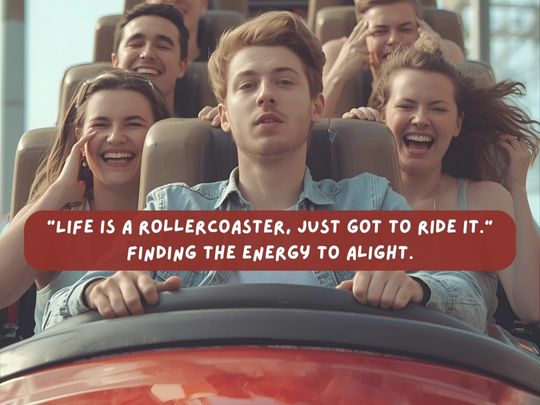
A new survey by Youth Employment UK has signalled that young people’s increasing levels of emotional neutrality is cause for concern. Why? Because we know where we stand when we, or others, are happy, sad or angry. But to feel nothing, masking concerns and complexities such as disengagement, can be dangerous.
The 2025 Youth Voice Census, which reviews the experiences of more than 8,000 young people across the UK, has dubbed this rising trend of indifference as ‘meh in the middle’.
Not only do I agree that a generation hiding in-between emotional extremes is worrying, but I can also relate.
For some time I’ve felt like I’ve been buckled into an invisible rollercoaster. Although there are moments that are rather thrilling, the ride of life continues to remain fast-paced, uncertain and seemingly without enough time for reflection. So, I repeatedly continue to experience the twists, turns and loops. I even know where to look for the cameras, but I don’t grin like I used to.
For me, this manifests itself as seasons of:
- Enjoying food, but lacking inspiration to cook or prepare healthy, quality meals
- Appreciating arts and culture, but counting down to the end as soon as it begins
- Liking challenging work but lacking belief and clarity in my role’s purpose.
Surprisingly, I've even gotten to a place where I don’t feel frustrated by these principles anymore because, over time, I’ve come to reluctantly accept them as my way of being. It’s not right, or my natural style, but the energy to change my state can seem out of reach. To live in constant ‘meh’ isn’t good but also isn’t worth extra effort.
So, what did I think was going to happen? The little energy I’ve been trying to preserve was always going to diminish due to a fluctuating diet, extended periods of isolation and a lack of routine and structure.
Thankfully, a recent ‘circuit-breaker’ holiday – packed with energetic hikes through mountainous trails, followed by Italian carbs and early nights – went some way in helping me realise that my flame to slowly burn out isn’t helpful or healthy. I do feel – I’ve just had zero zest to acknowledge my emotions.
Categorised as a state of physical, mental and emotional exhaustion, burnout can occur when individuals experience long-term stress and pressure and is a risk factor in developing mental health conditions such as depression and anxiety, according to Mental Health UK. Although often considered a consequence of workplace stress, burnout isn’t triggered by any one thing and can be linked to any excessive demands.
Even as a counsellor who champions and advocates for positive wellbeing, it’s likely I’d pushed any of my own symptoms – such as muscle ache (physical), self-doubt (emotional) and a slump in productivity due to difficulty concentrating (behavioural) – aside to avoid taking up support which could be used by someone who really needs it. But Mental Health UK’s 2025 Burnout Report is clear when it declares that 91% of UK adults have reported high or extreme levels of pressure or stress in the past year.
If this isn’t you, I’m pleased to meet you.
On reflection, I suppose burnout has some similarities to thirst. By the time it arrives, you’re past the point of need. So, finding ways, little and often, to understand your symptoms and triggers, and sharing this with someone you trust, like a counsellor, is key.
My holiday was restful, but it wasn’t restorative. It was a plaster. The key is to ensure you fully heal, before throwing yourself back into the arena.
Part of this includes ensuring effective boundaries are in place, but they shouldn’t just be work-focused. Be intentional in understanding your personal patterns to find areas of improvement. This could include:
- Using a paper diary to track my days and to-do lists, to minimise digital screen time
- Writing down worries or concerns to explore them from a different perspective
- Reflecting on one thing that made me ‘feel’ something during the day – a beautiful sky, a warm conversation with a colleague, learning a new fact
- Reducing the amount of content I consume (written, audio, visual etc) in favour of sitting with my own thoughts
- Going out for a short walk every day to combat loneliness, occasionally calling a friend and encouraging them to do the same
What works for me won’t necessarily work for you. These suggestions are part of an ongoing trial that I'm committed to testing and tweaking to gauge impact. But over and above their success, they’re also opportunities to pause to create space for a ‘think, feel, do’ health check: what am I thinking, how am I feeling, and what am I doing?
By asking ourselves these questions, without distraction, we can hopefully alight from the rollercoaster we've been wedded to and reclaim our feelings – moving from ‘meh’ to ‘yeah’.
The Fountain Therapy Trust is a long-term affordable in-person and online counselling service for local people across New Malden, Kingston, Surbiton, Wimbledon and beyond. If you want one-to-one support from a trusted therapist to help you process your feelings, get in touch to see how we can help.
Donna is an integrative counsellor running a small private practice, while supporting The Fountain Therapy Trust.
